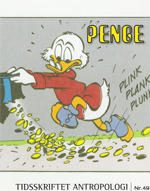SKILLINGEN, BRODEREN OG TABLETTEN: Penge og sundhed i det østlige Uganda
DOI:
https://doi.org/10.7146/ta.v0i49.106652Resumé
Complaints about fees at the government health facilities in Uganda are incessant, and
so are the more general statements about lack of money and problems of poverty. These
complaints, however, cannot be reduced to questions of cost and the availability of
resources. We also need to look at the kinds of exchanges money is made part of.
Health has long been part of the economic sphere in Uganda, and people compensate
healers and practitioners of different kinds for their services. The article explores why,
then, people experience it as far more problematic to pay for treatment in the public
health care system than to pay other health care providers. To answer this question
requires a discussion of money, not as destructive to social relations, but as creative
potential for relationships in all spheres of everyday life. In Uganda, as elsewhere,
money can be used both to pay somebody and to give somebody something. Money is
being made part of different modalities of exchange. In order to understand what takes
place in various kinds of clinical interaction we need to look at the complex intersection
of social relations, modalities of exchange, and the objects exchanged.
Downloads
Publiceret
Citation/Eksport
Nummer
Sektion
Licens
Ophavsretten til artiklerne i Tidsskriftet Antropologi tilfalder forfatteren.
Artikler publiceret i Tidsskriftet Antropologi må citeres, downloades og videresendes for ikke-kommerciel brug, under forudsætning af normal akademisk reference til forfatter(e) samt tidsskrift, årgang, nummer og sider. Artiklerne må kun genudgives med eksplicit tilladelse fra forfatter(e) og tidsskriftet.


